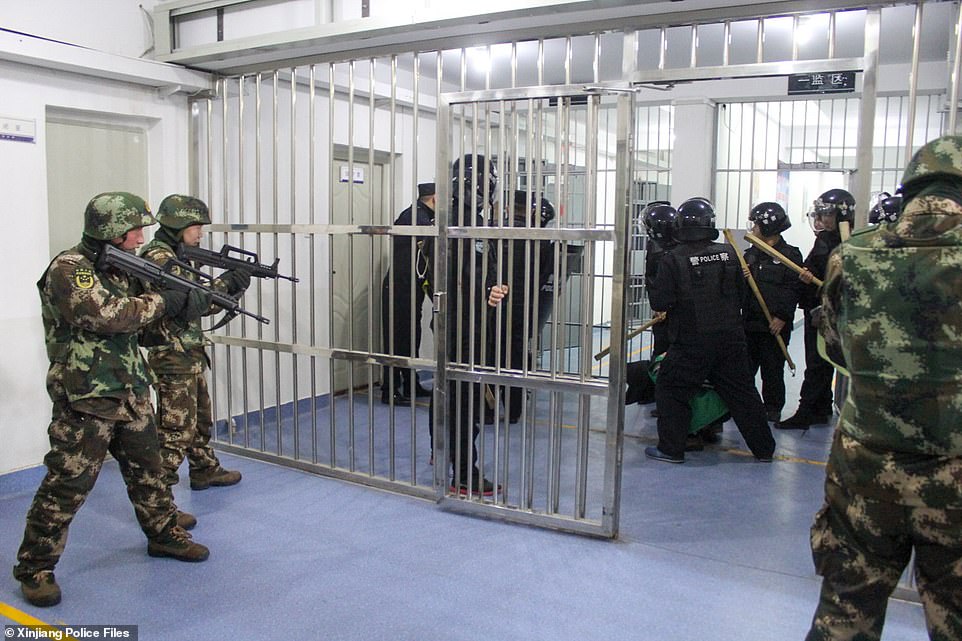The United Nations High Commissioner for Human Rights has released its much anticipated assessment on the treatment of ethnic Uyghurs of the Xinjiang Uyghur Autonomous Region (XUAR) by Chinese authorities, stating that the “arbitrary and discriminatory detention of members of Uyghur and other predominantly Muslim groups… may constitute international crimes, in particular crimes against humanity.”
The report concluded that there were “serious human rights violations have been committed in XUAR in the context of the Government’s application of counter-terrorism and counter-‘extremism’ strategies. The implementation of these strategies, and associated policies in XUAR has led to interlocking patterns of severe and undue restrictions on a wide range of human rights” adding that “These patterns of restrictions are characterized by a discriminatory component, as the underlying acts often directly or indirectly affect Uyghur and other predominantly Muslim communities.”
The UN also raised concern over the treatment of people held at “Vocational Education and Training Centers” (VETCs), which have often been described as detention camps for ethnic minorities. The report said that “allegations of patterns of torture or ill-treatment, including forced medical treatment and adverse conditions of detention, are credible, as are allegations of individual incidents of sexual and gender-based violence.”
“While the available information at this stage does not allow OHCHR to draw firm conclusions regarding the exact extent of such abuses, it is clear that the highly securitised and discriminatory nature of the VETC facilities, coupled with limited access to effective remedies or oversight by the authorities, provide fertile ground for such violations to take place on a broad scale,” the report added.
Likewise, the report went on to state that China’s “arbitrary detention and related patterns of abuse in VETC and other detention facilities come against the backdrop of broader discrimination against members of Uyghur and other predominantly Muslim minorities based on perceived security threats emanating from individual members of these groups.”
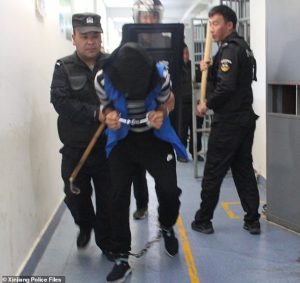
Below, I will list out some key points from the report, which can be read in its entirety here.
Vocational Education and Training Centers (VETCs)
The UN’s report described how “placement in such facility thus becomes an available consequence of having committed any type of act that can be construed as “terrorism” or “extremism”, regardless of whether the person is also criminally prosecuted, adding that “ There are further concerns that the law fails to provide sufficient legal certainty on core elements of the “education and transformation” system itself, such as the permissible duration for such residential programmes in VETC facilities or the criteria or procedure according to which individuals are or can be deemed appropriately “educated” and thereby liable for release.”
Concerns were raised, saying that “deprivations of liberty in residential facilities appear to have been without any apparent legal basis for a considerable period,” as well as “placements in VETCs appear to lack the process due in any context of detention, effectively depriving concerned individuals of the safeguards and protections that must accompany detentions as a matter of international law.”
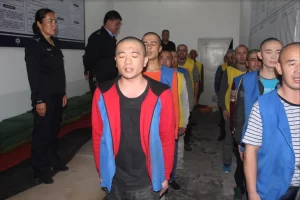
“Detainees do not appear to have access to lawyers or to be informed of the duration for their placement or the criteria for release, which are not spelled out in the law. Persons with which OHCHR spoke described some form of process, often shortly before their release, at which they were “informed” of their wrongdoing, of the authorities’ leniency in their case and of their sentencing to a prison term that subsequently seemed to have been waived (as evidenced by their release).”
The report summarized its points by stating that “based on the information reviewed, it is reasonable to conclude that a pattern of large-scale arbitrary detention occurred in VETC facilities, at least during 2017 to 2019, affecting a significant proportion of the Uyghur and other predominantly Muslim ethnic minority community in XUAR. The Government has indicated that VETC facilities are now closed and that all “trainees have graduated”,141 thereby suggesting that these facilities may no longer be in use. OHCHR is not in a position to confirm this, which is primarily due to the lack of relevant official or other information since the end of 2019 and access for on-the-ground verification. Regardless, considerable concerns remain, most notably due to the fact that the legal and policy framework that underpins the operation of the VETC system remains in place and, to the extent not currently employed, could be re-engaged at any point.”
Conditions at VETCs
Beatings and Torture
One of the first allegations addressed was beatings and torture, in which the report said that “Two-thirds of the twenty-six former detainees interviewed, reported having been subjected to treatment that would amount to torture and/or other forms of ill-treatment, either in VETC facilities themselves or in the context of processes of referral to VETC facilities.” The claims of mistreatment were said to have taken place during interrogations or as punishment for alleged wrongdoings, which included being beaten with batons, electrocution in what was referred to as the “tiger chair,” waterboarding, as well as prolonged solitary confinement and sensory deprivation.
“Persons reporting beatings for confessions described being taken to interrogation rooms that were separate to the cells or dormitory spaces where people were staying. Over two-thirds of the individuals also reported that, prior to their transfer to a VETC facility, they were held in police stations, where they described similar instances of being beaten while also immobilized in a “tiger chair” in those facilities.”
Hunger
“A consistent theme was description of constant hunger and, consequently, significant to severe weight loss during their periods in the facilities.”
Sleep Deprivation
Sleep deprivation appeared to be commonplace within the facilities. The report, citing people who were held at VETCs, described how constant surveillance by guards and lights being turned on throughout the night resulted in sleep deprivation. Some former detainees also described how they stayed up at night in two hour shifts to self police each other and prevent cell mates from praying at night so they would not be punished
Language and Religion
“Some also noted that they were not allowed to speak their own language (whether Uyghur or Kazakh) and could not practice their religion, such as pray, which they experienced as a further hardship.”
Patriotic Songs and Political Education
The report described how detainees were forced to”learn and memorize so-called “red songs” and other official Party material.”
“Interviewees consistently referred to this as an omnipresent aspect of their time in the VETC facilities, with one interviewee describing their experience as follows: “We were forced to sing patriotic song after patriotic song every day, as loud as possible and until it hurts, until our faces become red and our veins appeared on our face.”
Drugging
Detainees described regular druggings, which were done involuntarily through unknown injections, pills or both, as well as blood samples being regularly collected in the VETC facilities. The report stated that “Interviewees were consistent in their descriptions of how the administered medicines made them feel drowsy.”
Sexual Violence
The report also addressed sexual violence, including instances of rape by guards. Citing detainees, there were accounts of women “having been forced by guards to perform oral sex in the context of an interrogation and various forms of sexual humiliation, including forced nudity. The accounts similarly described the way in which rapes took place outside the dormitories, in separate rooms without cameras.”
“ In addition, several women recounted being subject to invasive gynecological examinations, including one woman who described this taking place in a group setting which “made old women ashamed and young girls cry”, because they did not understand what was happening. The Government has firmly denied these claims, often through personal or gendered attacks against the women who have publicly reported these allegations.”
Summary
“In conclusion, descriptions of detentions in the VETCs in the period between 2017 and 2019 gathered by OHCHR were marked by patterns of torture or other forms of cruel, inhuman or degrading treatment or punishment, other violations of the right of persons deprived of their liberty to be treated humanely and with dignity, as well as violations of the right to health. Allegations were also made of instances of sexual and gender-based violence (SGBV) in VETC facilities, including of rape, which also appear credible and would in themselves amount to acts of torture or other forms of ill-treatment. Based on currently available information, it is not possible to draw wider conclusions as to the extent to which there may have been broader patterns of SGBV in VETC facilities. The Government’s blanket denials of all allegations, as well as its gendered and humiliating attacks on those who have come forward to share their experiences, and have added to the indignity and suffering of survivors.”
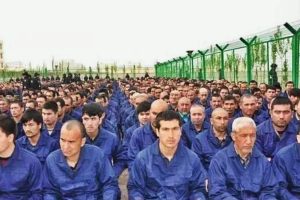
Anti-Terrorism Law System
“In summary, the Chinese “anti-terrorism law system”86 is based on vague and broad concepts that grant significant discretion to diverse officials as to their interpretation and application. Methods set out under the framework to identify and assess problematic conduct are simplistic and prone to subjectivity, and do not appear to be based in empirically obtained evidence that establishes the links between the indicators of conduct relied on and terrorism or violent extremism. Furthermore, the legal consequences attached to such conduct are unpredictable and insufficiently regulated.”
“Authorities are granted broad investigative, preventive and coercive powers with limited safeguards and independent judicial oversight. Individually and cumulatively, these factors present significant concerns as to the system’s compliance with international human rights law, establishing a framework that is vulnerable to arbitrary and discriminatory application, unjustifiably limits the exercise of legitimate rights, potentially subjects individuals to arbitrary detention, and fails to provide adequate safeguards to protect against abuse. In the context in which this system is implemented and by associating “extremism” with certain religious and cultural practices, it also carries inherent risk of unnecessary, disproportionate, and discriminatory application to the ethnic and religious communities concerned.”
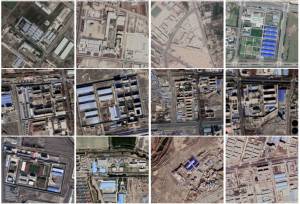
Imprisonment
The report explained that “the trend of increased number and length of imprisonments through the criminal justice system in XUAR strongly suggests there has been a shift towards formal incarcerations as the principal means for large-scale imprisonment and deprivation of liberty. This is of particular concern given the vague and capacious definitions of terrorism, “extremism” and public security related offences under domestic criminal law, that may lead to criminal prosecutions and the imposition of lengthy custodial sentences, including for minor offences or for engaging in conduct protected by international human rights law.”
Religious freedom
“The restrictions imposed on the exercise of freedom of religion with respect to Islamic religious practice in XUAR fall short of these standards. In terms of the legality requirement, while some restrictions are legally prescribed, others are a consequence of certain types of conduct being considered a “sign of extremism” in practice, even if the conduct as such may in fact not be unlawful, such as having a long beard or declining to use a television. Further, an aim to combat and extinguish “religious extremism”, given its breadth and vagueness, cannot of itself be a legitimate aim under international human rights law. Finally, generalized restrictions on a wide range of manifestations of accepted religious tenets cannot be characterized as necessary or proportional to such an aim.”
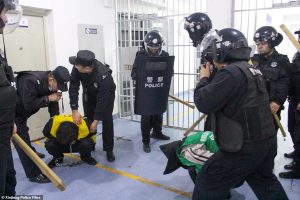
Surveillance
The report highlights the sweeping surveillance measures taking place in XUAR, such as “collecting and retaining data regarding several aspects of life, including personal biometric data,” as well as electronic surveillance.
Reproductive rights
“Several women interviewed by OHCHR raised allegations of forced birth control, in particular forced IUD placements and possible forced sterilizations with respect to Uyghur and ethnic Kazakh women. Some women spoke of the risk of harsh punishments including “internment” or “imprisonment” for violations of the family planning policy. Among these, OHCHR interviewed some women who said they were forced to have abortions or forced to have IUDs inserted, after having reached the permitted number of children under the family planning policy. These first-hand accounts, although limited in number, are considered credible.”
Family separation and reprisals
“The implementation of the purported counter-terrorism and “extremism” policies in XUAR has also had deep impacts on families. The widespread arbitrary deprivation of liberty of Uyghurs and other predominantly Muslim communities in XUAR, often shrouded in secrecy, has led to many families being separated and unaware of the whereabouts of their loved ones. This has been particularly so for the diaspora community where there have additionally been allegations of reprisals and intimidations against those seeking information about their family members or expressing concern publicly.”
“Claims of family separations and enforced disappearances were among the first indicators of concern about the situation in XUAR, with large numbers of people alleged to be “forcibly disappeared” or ”missing”. Approximately two-thirds of the 152 outstanding cases in China of the UN Working Group on Enforced or Involuntary Disappearances pertain to XUAR over the period 2017-2022.”


